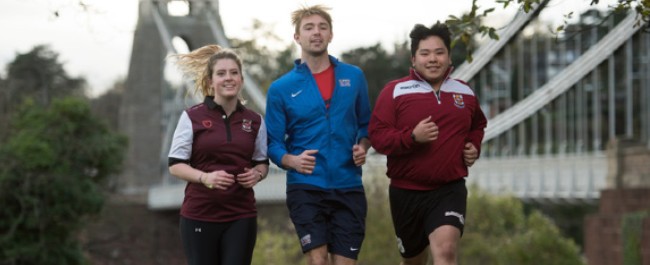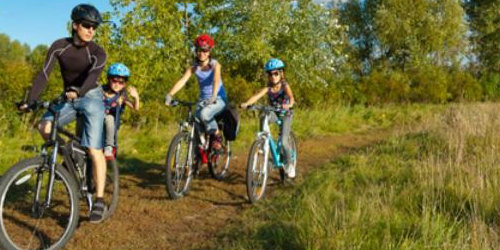Innovative physical activity interventions for at risk and disadvantaged children and adults

Globally physical activity in adults and children is very low despite compelling evidence regarding the increased risk of disease and death from insufficient physical activity (PA).
Despite national and international policy initiatives, over one quarter of the global population remain insufficiently active. To reduce the substantial economic and social burden of disease, interventions that can deliver benefits to large sectors of the global population are needed.
Research by Dr Angie Page and fellow researchers has developed innovations in ways of measuring activity, designing and implementing innovative PA programmes to identify and test promising interventions that can be scaled up, interventions to help those at highest risk, and cost-effective solutions to increase physical activity in disadvantaged groups.
This approach, combined with sustained partnership working, has enabled successful delivery of interventions across multiple settings and policy arenas (schools, streets, health services), scaled up from local to international level.
The researchers pioneered novel objective PA measurement methods using data from GPS receivers and activity monitors (accelerometers) to accurately describe activity behaviour and thus to identify and evaluate potentially scaleable interventions.
This led to the development of a novel street play initiative that now operates nationally and in 22 countries. It was also found to have an unplanned for physical activity benefit as a result of the temporary street closures, that of increasing the opportunity for many children to learn to cycle for the first time!
E-bike intervention to help those at highest risk
Type 2 Diabetes Mellitus (T2DM) is increasing globally; in the UK, the burden of management and associated disease accounts for ~10% of the NHS budget. Physical activity is central to managing T2DM but increasing PA and maintaining change in people with T2DM is challenging.
Research on e-bikes and health is in its infancy despite sales of these bikes having increased in popularity during the COVID-19 pandemic. Cooper and Page conducted the first systematic review on e-bikes and health, and the research supported the successful development of an e-bike intervention for people living with T2DM. The study showed both that e-cycling provided moderate intensity physical activity sufficient to improve health and that participants found e-cycling enjoyable, with 14 of the 18 participants purchasing an e-bike at the end.
It doesn't end there. The team worked in several ways to support policy action and implementation, including with national agencies such as Sustrans who manage the account for delivery of change in active travel in Scotland. In 2018, the Scottish government made a specific policy action to provide advice on the use of e-bikes to deliver economic and health benefits. In addition, clinical commissioning groups (CCGs) are now willing to commission active travel projects as an alternative to more established methods to promote increased physical activity in high-risk individuals.
The research has also been used to present alternatives to established practice for diabetes treatment in Bristol introducing the benefits of e-bikes and offering the unique opportunity to refer participants to try out an e-bike as a way to help manage their diabetes. Diabetes Edcucation days are the main component of programmes offered by the NHS in Bristol for treatment to patients newly diagnosed with diabetes and include a video of participants involved in the research trying out an e-bike as a way to help manage their diabetes and the positive impact it has had. Along with the feel-good factor! This is particularly important for adults, including those living with T2DM, who often have many failed attempts to change physical activity behaviour.
This engagement has led to new strategies and capacity for third sector agencies to offer e-bike loans and promotion targeting high risk groups including people with T2DM and cancer survivors. And e-bike providers have used our research to highlight the health benefits of e-biking to promote schemes to offset costs for electric bikes.
Collaboration with key national agencies has also increased representation of e-bikes in national and international monitoring tools which underpin Government policy. For example, we worked with leaders of the National Travel Survey to introduce the first e-bike question into their survey from 2019. The National Travel Survey is the longest standing survey on travel, has been copied in many countries and underpins Government policy, so this addition is a major milestone.
Increased provision and quality of extracurricular physical activity – reaching the most disadvantaged, hard-to-reach children
Building on a strong legacy of public engagement, particularly with local schools, the research was able to highlight the importance of after-school clubs as a source of physical activity.
The findings informed the development of a new scheme in partnership with local schools and sports providers called ACE. ACE is an assessment checklist which ensures high-quality extracurricular provision of physical activity and food in primary schools through external providers. ACE particularly targets children who do not take part in team sports as well as promoting healthy food options that are acceptable within children's peer groups.
This approach to integrating food and physical activity complements similar work leading on developing new standards for all outlets selling/serving food, called the Bristol Eating Better Award. Papadaki provided input on metrics to define content of the award along with advice on approach to evaluation. The Bristol Better Eating Better Award was subsequently highlighted as a case study in support of Bristol City Council's Healthy Weight Strategy (2017).
Citing this research into the benefit of out-of-school clubs for physical activity, Ukactive (an organisation that exists to improve the health of the nation by getting more people, more active, more often) recommended that Government should fund these activities, which would particularly help the most disadvantaged, hard-to-reach children, remain active and well-fed. Ukactive also recognised the value of the ACE award, and agreed to license it in 2019 as a means of driving national implementation for improved after-school and school holiday club providers.
The collaboration means that the award can be rolled out nationally; delivery of higher-quality physical activity and food provision in after-school clubs can be monitored; and provide better data on after-school club policies can be fed into local and national policy. The ACE award therefore provides a new pathway to accelerate impact on children's physical activity and food intake within the after-school setting.
The 2021 Research Excellence Framework (REF) results confirm the Centre for Exercise, Nutrition and Health Sciences position as one of the top centres of international research excellence within the field of physical activity, nutrition and health research.
Related researchers
Related research centres
Related publications
- The potential of electric bicycles to improve the health of people with type 2 diabetes: a feasibility study
- Patterns of GPS measured time outdoors after school and objective physical activity in English children: the PEACH project
- Randomised feasibility trial of a teaching assistant led extracurricular physical activity intervention for 9 to 11-year olds: Action 3:30
Funding
Action330: Promoting children's physical activity via enhanced after-school leadership
Related research
 Study Exercise, Nutrition and Health
Study Exercise, Nutrition and Health
Contribute to cutting-edge research improving policy and public health.